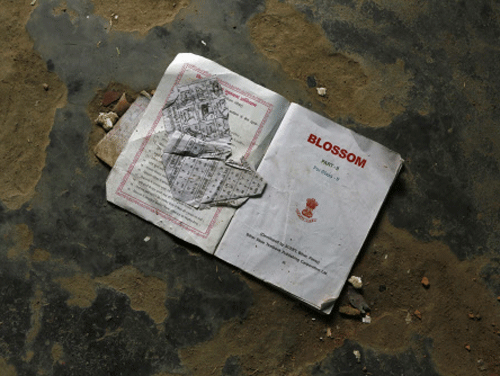
The midday meal directorate on March 26, 2012, issued a circular to all government primary schools stipulating that cooked food should be served to students only after being tasted by the cook, a teacher or the headmaster/headmistress and a member of the school management committee, comprising mothers of the students.
Perhaps, not a single school in Bihar follows the directive. A day after the tragic Masrakh incident in which 23 children died after having midday meal, a Deccan Herald team visited several government schools in Chapra to check on the Centre’s flagship programme which costs Rs 13,215 crore annually. Around 11.36 crore children are served cooked food under the world’s biggest meal scheme.
One such school was the Prathmiki Vidyalaya at Saguni in Saran district. A few seconds after our photographer started taking pictures, at least 50 children gheraoed him. Before one of them could muster enough courage to speak, a local heavyweight clad in lungi barged into the school campus.
He gave me a piercing look. “Janch padtal karne aaye hai. Kahan se aayein hai? Kisse puch kar aayein hai? (Have you come to investigate? Where are you from? With whose permission have you come?)”
Not prepared to face such bombardment in front of the children, I decided that offence would be the best defence.
“I am a journalist doing my job. So neither interfere in my work nor try to bully me… or else be prepared to face the music,” I gave a terse reply.
Seeing my tough posture, he disappeared sooner than he had arrived. One of the children then spilled the beans. “Sir, this menu is just for records sake. We never get rajma-chawal, chola-chawal and dal-pulao. All we get is khichdi and occasionally rice with seasonal vegetables,” said one student.
We entered a dingy room where two cooks were preparing the midday meal. They rued their meagre salary of Rs 1,000. “What ever master saheb gives us, we cook it for the children,” said one of them. “Had I opted for farming, I would have earned more, around Rs 150-200 per day.”
On further probe, we found that foodgrain for the midday meal is allotted to the state Food Corporation through the Food Corporation of India. It is then passed on to the block education officer (BEO) who distributes it to the schools. However, contractors sneak out several kilograms of foodgrain from bags with midday meal stamps. Incidentally, the bags are never weighed.
This is not an isolated case. In a majority of the places, headmasters, teachers, BEO, BDO, circle officer, top bureaucrats and politicians are hand in glove and siphon off several crores of rupees.
Deccan Herald is on WhatsApp Channels| Join now for Breaking News & Editor's Picks